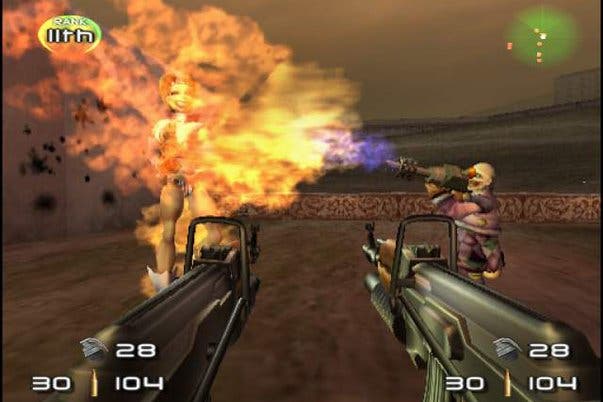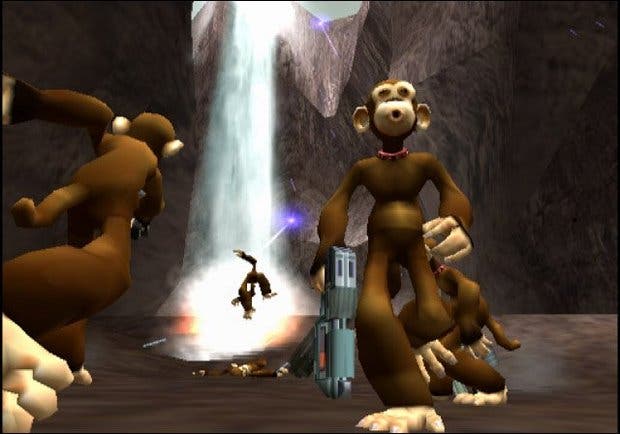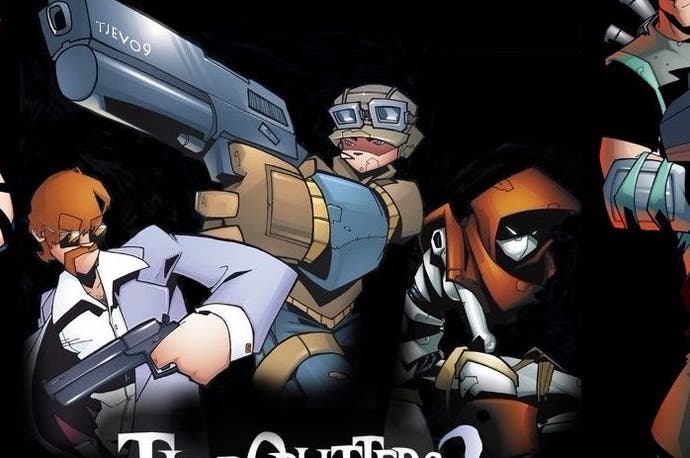Long tail: the near-endless joy of unlockable content
Dime-splitters.
The ubiquity of Season Passes and layers of post-release DLC is a standard part of today's gaming landscape. Many saw it coming with Oblivion's infamous horse armour; with the majority of modern consoles constantly gulping down new data from our gaping broadband pipes, it was only a matter of time before publishers saw the opportunity for earning regular chunks of income. And why shouldn't they? Businesses are, after all, in the habit of making money, and adaption to the target market is a vital part of this process. The problem, though, is twofold: firstly, as customers with brain cells, watching DLC fragments become Season Passes, which then evolve into paywalls that lock out initial players, can often leave a sour taste.
And the second problem is TimeSplitters 2.
There was a time, before marriage and babies and learning how to bake (I bake now, apparently), that I could play video games for as long as I wanted. Imagine that. It feels like a universe away, but fifteen years ago the only things that would interrupt my quality PlayStation 2 time were the twin calls of bladder and stomach. I had my own room in a nice warm house and a fat CRT that teetered tipsily on the edge of a desk that hadn't seen a pen since the end of university. And I had a steady income that, once the rent had been paid, I could spend on anything without guilt or remorse. So, of course, it all went on music and video games.
Having spent a few years working in Cardiff Queen Street's then-massive HMV, my CD stack was somewhere north of ridiculous, but my game collection could stand eye-to-eye with it any day. I still accumulate games now, of course - albeit at a much slower rate - but the difference then was that I actually played the hell out of all of them. They were used as currency too; stacks of them would be traded-in once I'd drained them dry, back when that actually was a reasonable course of action.
There were some titles that I kept, though, either because of their emotional resonance or from the sheer enjoyment that they created - Ico, then Shadow Of The Colossus; Rez, Tony Hawk's Pro Skater 3, Point Blank, Kurushi Final, Kula World, Burnout 3, God Hand, and so on. TimeSplitters 2 was in there too, but it wasn't just for its exquisite level design and shooting feel; it was stuffed to bursting with delicious unlockable treats, and I couldn't ever stop digging for those treasures.

Hours would pass as I lay out on my bed flying through the story levels for the fiftieth time, before heading into the Arcade League and Challenge modes to try and unearth new wonders. League's design was the perfect blend of tease and reward - digital crack for the FPS completionist - offering Bronze, Silver, Gold and Platinum medals for meeting requirements and deadlines. Accumulated medals swung open the door for new collectables; not just weapons and characters, but even entire game types and scenarios that would make thrilling games by themselves. As with much of Free Radical Design's ethos, variety and originality were key to making these modes so enjoyable. Maybe you'd completed a level where cowboys ran at you with rocket launchers. Nice work, but can you do it as a monkey? How many windows can you smash with bricks in one minute? Here are some flaming clowns in a circus tent. They're going to kill you. Good luck.
Somehow, the medal currency gate was perfectly balanced to give you the feeling that, if only you'd blown up that zombie duck gangster just a little faster, you could have achieved what you'd needed. Nothing felt unfair or out of reach; everything was just close enough to snatch. All you had to do was practice and practice and develop the perfect run. As soon as you cracked the first few unlockables and witnessed the series of tremendous carrots that were waiting for you on the end of each stick, it was impossible to ignore the constant call for attention.
These days, my gaming time is a rare novelty that sits exclusively in the sliver of hours between my oldest kid going to bed and the inexorable pull of sweet unconsciousness waiting for me on the sofa. The Witcher 3 and Fallout 4 stare blankly down from my shelf, unloved; the last time I tried to explore White Orchard I woke up to find I'd been walking Geralt into a wall for an hour. My gaming thrills are now required to fit into shorter bursts, with more immediacy, and with quicker tiny rewards. I frequently think back to my hours with TimeSplitters 2, not really yearning for the time again, but instead for the feeling of delving into a treasure box whenever I turned it on.

Things like Downwell and Nuclear Throne have been scratching that itch somewhat, but the only big console titles from the last year that have given me a similar sense of electric feedback are Mad Max, with its myriad car upgrades (and astoundingly good vehicle battles), and Call Of Duty Black Ops 3. Yes, I know, preconceptions are powerful when it comes to CoD. But aside from the most lunatic single-player campaign I've played in years, Treyarch has stuffed it full of extra game modes, all in glorious split-screen; and that's without even getting into the depths of its multiplayer component. I'm older and largely sceptical of most gaming these days, but the feel of wanting to dig back and unearth these games' wonders is reminiscent enough for the old pleasure receptors to get all fizzy again.
I get the feeling that, at some point, developers all decided to make DLC and Season Passes a way to stop players trading in their boxed titles, and therefore force potential buyers to pick up new copies instead of used. The whole thing's mutated, though, with lofty promises of extra content now being waved under our noses before the base game has even seen the light of day. It's impossible to shake the feeling that most of these monetised extras would have once been included as unlockables, and such a cynical approach can drain away any positive feeling before the first button is even pressed.
Maybe one day there'll be a shift of attitude back to before games were only finished with day one patches - when the whole game, and often more, was stuffed on a disk, just waiting for you to explore. Because, in terms of retention, it's never the tease of future additions that'll make me keep a title in my collection. If it has fun, originality and variety in constantly revealing layers, then I'll play, and replay, forever.

